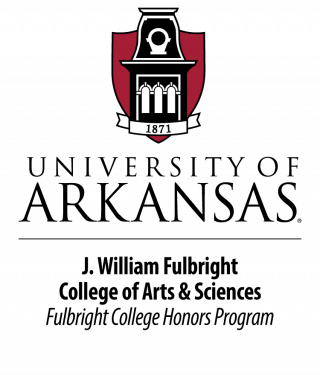By Dr. Kirstin Erickson, Director of the Fulbright College Honors Program
Here in Fulbright Honors Studies, we are often asked, “Should I apply for the Sturgis International Fellowship or the Sturgis Study Abroad Grant?” This is a great question. While both grants are funded through the generosity of the Roy and Christine Sturgis Charitable Trust, they are geared toward different types of international experiences and serve different needs and goals. This article provides an overview of the features that distinguishing these awards from one another, and some tips for writing a compelling application.
Sturgis International Fellowship (SIF)
The Sturgis International Fellowship is intended to help undergraduate students pursuing an honors degree in Fulbright College, as well as graduate students whose major fields of study are anchored in Fulbright College. The SIF requires a minimum of four months of residence in a foreign country and is a research-based or internship-focused grant. Students who apply typically have a research project they intend to work on while abroad – a masters’ thesis, doctoral dissertation, or an honors thesis. Some applicants also pursue long-term international internships. In addition to filling out the application questionnaire, students must obtain two letters of recommendation from U of A faculty members, present a letter of support from a host institution, school, or organization, and must upload a CV/resumé and working budget. The SIF is due in early March (check the website for exact dates) and the application is now on-line – students submit all materials (except letters of recommendation) through the HogsAbroad application portal.
There are two essays for the SIF – a project proposal and a personal statement. Both pieces are vitally important to the committee, as they help us evaluate a student’s preparedness for research and international study, the study’s originality and academic merit, a demonstrated connection to one’s career goals, and/or the potential for impact of an internship.
What does the committee look for in the SIF Project Proposal?
The project proposal should demonstrate that you have a well-developed plan for your research project or internship. You need to be able to clearly articulate a thesis statement and a working plan for your project (with major objectives, methodology, and timeline for completion). Tell us why travel to this particular country is necessary to the success of your project; demonstrate your knowledge of the unique resources available on-site, and show us that you have made a genuine effort to establish a network of local contacts. Your proposal needs to include a statement about the overall objective and potential impact of your internship or the originality of your research project. Ultimately, we are looking to fund projects that are practical, carefully-planned, and feasible, considering the resources, funding, and time available.
What does the committee look for in the SIF Personal Statement?
The personal statement is your chance to situate your intended study abroad experience (research project or internship) within the arc of your own academic trajectory. Tell us how you initially became interested in this project or region; describe the research or coursework that has prepared you for your project and your time abroad. This might include your participation in field schools, a lab, language preparation, specialized coursework, and more. Demonstrate how your project/internship relates to your longer-term academic goals and professional aspirations. The personal statement is vitally important, as it enables the committee to get to know you – in a holistic sense – beyond the narrow confines of your proposed project. We are inspired by students who are passionate about how longer-term international study might provide a life-enriching, even transformative experience.
Sturgis Study Abroad Grant
The “Sturgis Grant” targets a very different need. This grant is available to undergraduates earning an honors degree in Fulbright College and aims to provide financial support for full-time study abroad in either a UA faculty-led program or a UA-approved external program. Students must be in good standing in honors and must have completed at least 6 hours of honors credit by the date of application. (Exception: 1st year students must have completed 3 hours in their first semester and be enrolled in 3 hours in their second semester.) We fund full-year, semester-long, summer, and intersession programs, and to be eligible, students must take a “full time” course-load while in their program (3 hours for intersessions, 6 hours for summer sessions, and 15 hours for a semester).
Sturgis grants are getting more and more competitive every year, so in your essay, plan to make a strong case for why we should select you as a recipient. Avoid sweeping statements and vague generalities. While leaving your “comfort zone,” making new friends, and gaining exposure to new cultures, languages, and educational styles are all worthy endeavors, these are also experiences that impact every student who studies abroad. Emphasizing these aspects will not set your essay apart from those of other applicants.
We recommend that you focus on how your selected study abroad program will impact your own, unique academic trajectory. Will the coursework in your study abroad program contribute to the completion of your major or your minor? If so, how? Will the city in which you will live provide access to research materials you’ll need to write your honors thesis (an opportunity for an interview, access to a national archive, research experience in a unique ecosystem)? If so, describe the targeted opportunities of which you’ll avail yourself while in-country. Does your intended study abroad program relate strongly to your professional goals or plans for post-graduate study? If so, explain. Overall, students who can articulate how the study abroad experience will benefit them on multiple academic fronts (and/or in intersectional ways) will be stronger candidates for the grant.
Through the Sturgis grant, we seek to provide meaningful funding to Fulbright honors students. There are two deadlines per year – October 1 (for those seeking to study abroad in the January intersession or following spring semester) and February 1 (for those seeking to study abroad during the following summer, fall, or academic year). We encourage you to put your best foot forward and apply for funding!


